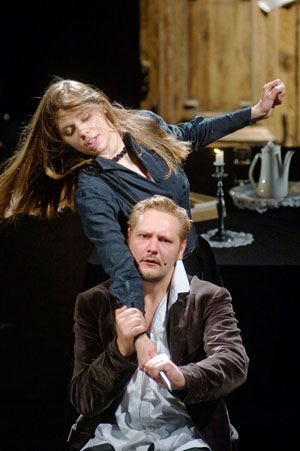On vain love efforts
On November 26 and 27 Kyivites will see the world premiere of Nekrosius’ The Idiot
Too rarely do famous directors come to Kyiv. The last time the Vilnius Theater Meno Fortas came to our capital was over five years ago (with Hamlet and Othello). This time the Lithuanians are bringing one of Eimuntas Nekrosius’s latest works, The Idiot, to be staged in the Franko Theater.
It is quite natural that the stage director chose this novel of Dostoyevsky. The performance about Pirosmani first unveiled this “Lithuanian genius,” as the theater critics call him, to us. Almost all the main characters of his performances are a bit “crazy,” as they are the people whose reactions, evaluations, and expressions run counter to narrow-minded philistine logic. Who is normal and who is crazy or sick? Those who react with heart and empathize with someone else’s pain, or those who are indifferent and self-centered? Obviously, everyone decides for himself. Anyway, the point is not in the definitions but what life we want to live: intelligent, full of emotions, which are sometimes tragic, or bright on the outside but empty inside. Unquenchable thirst for the former confirms that Nekrosius has made up his mind. Being sensitive to the joy and pain of the world he saw a soulmate in prince Myshkin.
It is clear from the first minutes of the performance that we will see human suffering and pain. We hear the heavy breathing, amplified by electronic devices, of a sick person, which superimposes the heavy breathing of a tired locomotive. The young prince did not recover in Switzerland, and he is coming back home to Russia, where he is going to suffer not only physically but also emotionally. Two hospital attendants (they are border guards/customs officers) will lift Myshkin on the stretcher and carelessly toss him right on the stage, like a piece of lumber. As always, Nekrosius has filled the metaphor with many meanings, one of which is the European’s careless attitude towards us. It is also about the indifferent and heartless attitude towards each other in our country. In the next episode Rogozhin drags pale, shy and unprotected Myshkin (played by Daumantas Ciunis, with whom Nekrosius works for the first time) across the stage like a sack of potatoes. He is the one, who will tell the young prince about his fatal love for Nastasia Philipovna and will unintentionally involve his new comrade in a difficult intricate love drama, which will be so tense in the end that tragedy is inevitable.
A dark, inescapable fate, which comes to a tragic end, is Nekrosius’ favorite topic. The theater experts explain the director’s preference to look at death’s face by the meaning of his last name, which can be translated as “deathly” or “bony.” He does not hide from reality. It is a rare phenomenon today not to hide one’s head in sand but to accept life with all its tragic contradictions and twists. Nekrosius does not conceal his negative approach to life, which is shown in his fatalism. He is convinced that you cannot avoid your destiny, “I am fatalist: or the way it has to be — it will be! Actually, very few things depend on you.” Certainly, you may not agree with the gloomy outlook on life and man. But what we have to agree with is the fragile, ephemeral nature of happiness in this world. All the attempts of the heroes to find happiness in earthly love-passion turned out to be useless (let us remember what he said in Othello).
The Lithuanian director has this outlook on life, which is not contaminated with the mass consumer ideology. His outlook seems to be naive and childishly simple to some extent, and he asks questions all the time. He is very sophisticated and piercing when he talks about the unsteadiness of existence. Just like any master, who is determined to be a philosopher, Nekrosius is not fussy but thoughtful and steady in his work (between the performances he is slow to speak about the tragedy of the real world, which pretends to be happy; slowness is also a feature of any person, who grew up on the land, especially a Baltic peasant). Accordingly, his stage expressions neither fit into the habitual aesthetic nor temporary canons and formats of modern theater. The Idiot lasts for over five hours! That is why the performance will start earlier than usually (at 6 p.m.), which is a hassle for entertainment seekers. But it is worth the trouble.
The organizers of the Meno Fortas tour are ArtHouse production company, and Vasyl Danyliv’s “Svitlo Mrii” foundation, supported by the Ministry of Culture and Arts of Ukraine and the Embassy of Lithuania to Ukraine.






